When it comes to retail, passion can be a key differentiator that helps brands rise above the noise. And when passion is combined with storytelling that’s deeply intertwined with your brand, a retailer could have a formula for sales success.
So it’s no surprise that the founders of Ventana Surfboards and Supplies are passionate about the ocean — and preserving it. For co-founder David Dennis, waves break right at the foot of his backyard and he uses a home office right across the street from the beach in Santa Cruz, California. With the beach just steps away, Dennis manages to surf the local waves about three to four times a week. His business partner, Martijn Stiphout, who is also the master craftsman responsible for creating Ventana’s beautiful wooden surfboards, still gets out in the water five days a week.
And it’s this respect for the water that’s helped the duo cultivate a brand that’s hustling to change an entire industry, one board at a time.
Disrupting an Industry
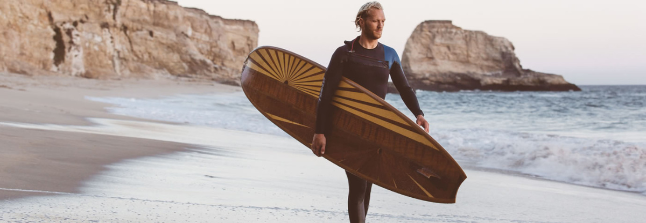
Image Credit: Ventana Surfboards
Dennis and Stiphout, like most California surfers, worship the water. But unlike many of their contemporaries, they’re mindful of the waste produced by the sport of surfing.
People surprisingly don’t really think about the impact surfing has on the ocean,” Dennis explains. “Surfboards are an environmental disaster, so we’re trying to change that.
Dennis and Stiphout founded Ventana Surfboards and Supplies with the aim to be the most environmentally responsible surf company on the planet. As an online surf shop and wholesaler, the duo produces wooden surfboards, bodysurfing handplanes, and eco-surf supplies including graphic t-shirts, hoodies, and other apparel for men and women.
Ventana’s wooden surfboards are true works of art — Stiphout spends four to six weeks on each board, totaling about 60 hours. The wooden boards have a hollow interior, which helps them surf smoothly, and the wood is entirely recycled and donated by local companies.
Heavier than a typical surfboard, the wooden boards are high performance and surf faster than a traditional board. Most importantly, they don’t contain any foam, which isn’t recyclable and often finds its way into the ocean when a regular board breaks. Considering that the average professional surfer breaks many boards every year, and that adds up to a lot of waste. Not to mention that the board fragments that are recovered from the water simply end up in a landfill.
As the first company in the world to have all of its boards gold verified for eco-friendliness, Dennis and Stiphout have gone above and beyond to ensure all of their products have a low impact on the environment. Apart from using donated wood, which would otherwise be trashed, Ventana uses eco-friendly materials like bioresin, which is made of mostly tree sap.
The company also takes its dedication to the environment to the next level, donating at least 5% of its profits to ocean conservation efforts such as Save Our Shores, the Surfrider Foundation, and the Monterey Bay Aquarium.
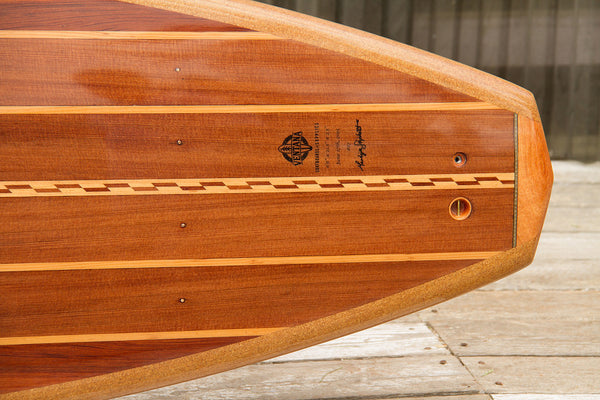
Image Credit: Ventana Surfboards
In fact, the Surfrider Foundation is actually what brought Dennis and Stiphout together in the first place. Seven years ago, Stiphout started creating his unique take on hollow wooden surfboards out of necessity. He wanted to build a surfboard and didn’t have a ton of extra cash, so he decided to build a board out of old, reclaimed wood.
When he surfed with his homemade board, it caught the eye of many other surfers in the lineup. Their interest inspired him to start building them, and word quickly got out about the boards. Then, as fate would have it, Dennis photographed Stiphout for a project to raise money for the Surfrider Foundation. As a surfer himself and passionate advocate of protecting the ocean, Dennis had the idea to create an eco-friendly surf company. They joined forces about two-and-a-half years ago and reincorporated as Ventana Surfboards and Supplies, adding accessories and apparel into the sales mix to give customers a full line of eco-friendly surf products.
Define Your Retail Mission: Living Your Brand Values
Dennis and Stiphout have a singular goal in mind: Being the most environmentally responsible surf company on the planet. And they’re taking steps toward that goal via three core brand values: craftsmanship, responsibility, and adventure.
When it comes to craftsmanship, they have a high bar for all of their products, from the wooden surfboards down to their surf wax and t-shirts. Environmental responsibility is at the heart of their values, with most of what they make created from recycled and reclaimed materials. And in terms of adventure, all of Ventana’s products are practical — they’re meant to be used in the water and withstand the elements.
They duo also host numerous pop-up shops and appear at many events across their home state, and donate a portion of their sales to local ocean conservation groups wherever they’re hawking their wares, be it in San Diego or San Francisco.
“For us, you can’t really have a surf company without a clean ocean. It just made sense [to donate the 5% of sales] from that perspective. Then, from a marketing perspective, people want to know that the products they are buying are ethical, are moral, are doing the right things for the world from a social responsibility and environmental responsibility perspective,” says Dennis.
Hot coat of @entropyresins on a handplane with redwood, Indian rosewood from @SCGuitar and cedar from @MontereyAq benches ♻️ #bodysurfing pic.twitter.com/6Cu0HdsIXQ
— Ventana Surfboards (@ventanasurf) May 14, 2017
As a part of their dedication to the environment, they’ve also started the Ventana Upcycle Program. The program partners Ventana with other companies to turn their trash into new surfboards. Each piece of wood has an interesting story, with suppliers like the Santa Cruz Guitar Company, which provides exotic wood offcuts from guitars. Other reclaimed wood has come from wine barrels, benches from the Monterey Bay Aquarium, and from home renovations, with all selvage wood transformed by Stiphout.
One of Dennis’s favorite moments was receiving wood from The Western Flyer Foundation. The nonprofit donated wood from the boat that local author and Nobel Prize winner John Steinbeck used to sail off to Mexico in the 1940s.
While the stories behind the wood is a compelling component to the boards (who wouldn’t want a board made from John Steinbeck’s boat?), the quality is also a key selling factor. Some of the boards are made from wood that’s no longer legal to harvest. For example, Ventana used old-growth redwood that was donated in the form of old floorboards from the 1800s.
While being ecologically responsible, the Ventana Upcycle Program also makes good business sense. Dennis and Stiphout have a policy against paying for wood and instead supports suppliers through cross-marketing and promotion.
“So, we basically take all of this trash away, we turn it into the surfboards, and then we turn around and promote those companies whenever we get press or media. So these companies then get free marketing for their trash,” Dennis explains.
Building Brand Awareness: Know Your Customer
While many surf brands, including the likes of Volcom or Quicksilver, focus on a younger demographic of surfers, Ventana Surfboards and Supplies focuses on older customers who respect the craftsmanship of wooden surfboards. Their ideal customer can also afford the $4,000 to $6,500 price tag for their artisanal, upcycled boards.
Since Dennis and Stiphout embody their customer, it was easy for them to determine the best ways to market their product to this demographic.
“We tend to sell to people that trend a little bit older — 30 years old and above. A lot of brands tend to focus on the young kids. We tend to focus on what we call the soul surfer — someone who is a little bit older, loves the ocean, and appreciates art,” says Dennis.
The majority of their clients are men, both locally and from across the golden state. They’ve also received orders from Australia and from up the coast in Vancouver, recently working on a board for a client who found the company through their Instagram.
Dennis admits that he expected Ventana to mostly cater to men, but says the reality is that while men mostly used their boards, Ventana’s apparel does well with both men and women. Additionally, a lot of women purchase the boards as gifts for the surfers in their lives who have everything.
For those who can’t afford to shell out thousands of dollars on a surfboard, the apparel fills an eco-friendly void in surf attire. To follow their brand values, the clothing is made in the USA from organic cotton and bamboo. The hangtag for the branding and pricing of the clothing is also sustainable and uses recycled materials made from the trash of two companies. The cord can be used as a leash cord for a surfboard, and is made of scraps of paracord while the wood is typically sourced from the Santa Cruz Guitar Company. In total, their revenue is approximately 60% surfboards and handplanes and 40% apparel and supplies.
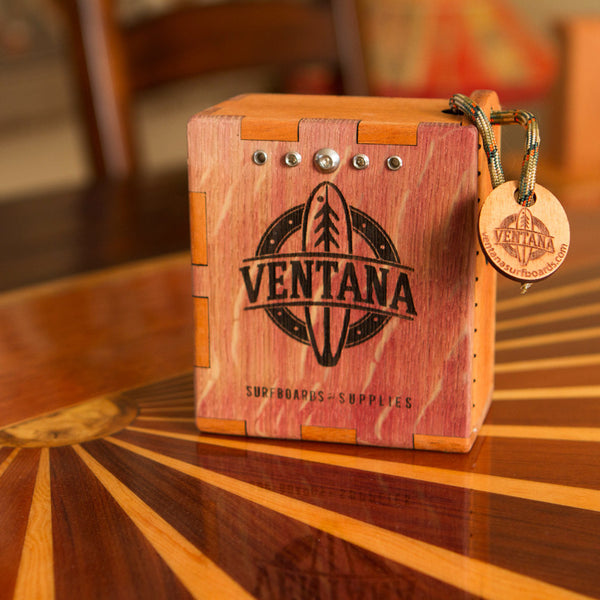
Image Credit: Ventana Surfboards Flickr
Apart from the apparel, Dennis and Stiphout have gotten creative by producing products that follow their eco messaging and appeal to their clientele. One example is the Ventana Save-a-Surf Box, which is a kind of tool kit for surfers that’s made from the trash of five different companies. The box stores surf necessities like wax, screws for surf fins, a leash cord, and scraper, in addition to quirkier accessories such as an alan wrench/sun dial device, a bottle opener in the form of a ring, and a guitar pick cut from old hotel card keys — a subtle nod to Santa Cruz Guitar Company, which provides the wood offcuts for the box and is a major supplier for Ventana. At $49.50, the Ventana Save-a-Surf Box is priced so that those clients who might love the wooden surfboards, but can’t quite afford them, can still own a piece of the brand.
These kits, along with the apparel, are also sold wholesale to clients who were secured solely through personal relationships. The wholesale division accounts for 15% of their business, with the majority of sales remaining direct-to-consumer, as the wooden surfboards are solely custom orders.
Authentic Storytelling + Targeted Events = Sales Success
With its combination of eco-friendly mission and custom, artisanal boards, Ventana’s biggest strength as a company lies in its quality product and its messaging. The wooden surfboards are distinctive compared to the typical boards that surfers regularly see, and often spark conversations at events.
“We always have our surfboards on display and people come up to the booth and see them and...it opens up the conversation to talk to them more about the brand and what we are doing from a sustainability perspective. For us, events where we try to get at least 500 to 1,000 people turning up is a great way to spread the brand locally,” says Dennis.
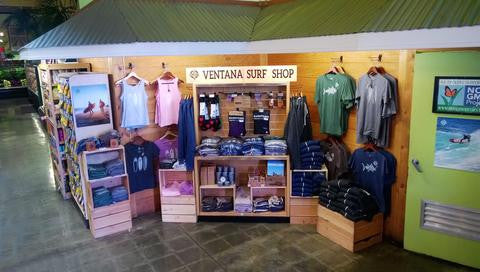
Image Credit: Ventana Surfboards
Dennis runs eight to 10 pop-up shops a year, and thoroughly researches each event to ensure the right shopper demographic will be present. He also makes a point of being the only surf company present to avoid getting lost in a sea of vendors. This reflects positively on sales — Ventana makes the most revenue from events, especially when it comes to their apparel. One-on-one interactions also provide a great platform to spread the brand’s message of ocean sustainability.
Apart from appearing at major events such as the Earth Day Festival in Santa Cruz and the West Coast Craft Sale in San Francisco, Dennis has also organized his own events for the brand.
“We try to put on events that fit with our brand values,” Dennis notes. “We’ve done some really interesting stuff like a food truck and artisan fair at the beach here, and it was actually the first zero-waste event in Santa Cruz County. We made the front page of the paper.”
Word-of-mouth referrals also help fuel their business, with many people contacting Dennis to express their respect for the brand and offering up materials for the Ventana Upcycle Program.
The Power of Promotion and Partnerships
Dennis uses social media to further promote the brand and has gained the attention of major companies like Starbucks and Lucky Brand Jeans. The coffee giant featured Ventana in a short production called The Art of the Craft, which has more than 17,000 views on YouTube.
Social media and buzz from the press also brought Ventana its first national television appearance on Handcrafted America.
Social media also plays a crucial role for Ventana, especially when it comes to building relationships with other brands. For example, Lucky Brand purchased two boards for its California outlets, creating opportunities for brand visibility through foot traffic in the brick-and-mortar stores. And the denim apparel brand discovered Ventana through their Pinterest profile.

Image Credit: Lucky Brand blog
“Social media has definitely been more important for us,” Dennis notes. “We have focused more of our energy on Facebook and Instagram, but we have had some really interesting deals.”
Ventana Surfboards and Supplies has also cross marketed its products with smaller local brands and runs a featured artist program on their website, donating leftover materials to chosen artists. Most partnerships come from existing relationships, including a recent brand collaboration with Humble Sea Brewing Company. Two of the founders were handplane customers who also embodied Ventana’s values. Dennis decided to dub these fellow entrepreneurs as Ventana Adventurers, which gives partner brands promotion on the Ventana website. From there, the two companies decided to collaborate and create two beers, the Ventana Spruce and Ventana Cedar, and launch the beverages at a tasting event in support of ocean conservation.
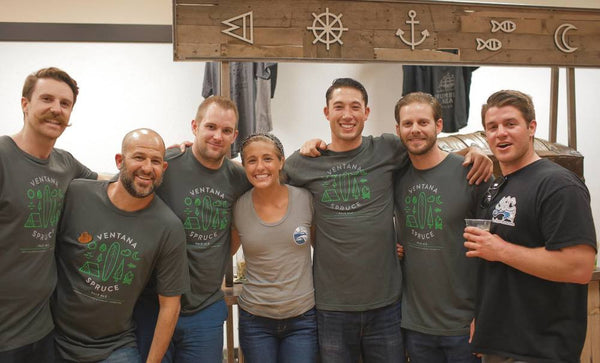
Image Credit: Humble Sea Brewing Co.
“We partner with companies that share our brand values. They have to be creating products in a responsible way — be it social or environmental. We like to work with women-owned businesses and small businesses, and then adventur[ous businesses]. For example, the woman who makes our belts — they’re belts you actually would wear,” says Dennis. “We’ve created these really interesting collaborative stories about environmental responsibility and that helps us to create some really compelling social media content.”
While posting pictures of their beautiful boards captures likes on social media and encourages sharing, co-marketing and event promotion have been key to the success of Ventana Surfboards and Supplies. And above all else, storytelling with content that resonates with Ventana’s target audience has resulted in a loyal following.
Play to Your Strengths
While experiencing a steady stream of success, Dennis says that the biggest challenge for the co-owners is having the time to do all the things they want to do. While the business is profitable and has recently hit a milestone of selling its 100th board, Dennis and Stiphout are not quite ready to expand their team. Additionally, as a 16-year Microsoft veteran, Dennis couldn’t imagine leaving his day job. This is why he dedicates the free time he has to the areas of the business he’s passionate about — marketing, branding, and technology.
Our thing is to focus on your strengths. Don’t try to do the things that you are not good at or don’t like to do.
"I’m not allowed to use the tools — I’ll probably cut my fingers off. My partner hates social. So, I focus on the stuff that I love, which is the technology and the online stuff, the business development, the marketing, and he focuses on the craftsmanship,” Dennis said. “If we expand our wholesale business, we will want to bring in somebody who is passionate about being a sales rep.”
From a technology perspective, Dennis also recommends utilizing the resources available to business owners. Starting his career in web development in the 1990s, Dennis can’t believe the tools now available relative to what used to be open only to large ecommerce brands.
“I am amazed at the power you can bring to a small business by what you can bring online,” he says.
And for those who aren’t as tech savvy? Outsource. Partner with local freelancers who are open to working with small businesses and don’t waste time that could be spent working on a project of interest.
“I find that a lot of artists, small business owners, designers, if they spend too much time working on the technology, if they are not passionate about it and aren’t good at it, they end up spending not enough time at what they’re really good at — creating art, or designing products, or whatever. I would outsource it, frankly.”
Dennis clearly knows his strengths, with Ventana Surfboards and Supplies messaging making its way into the media and results in increasing sales year over year. He knows his customers and understands what’s important to his target audience, so it’s no wonder why the response to Ventana has been so positive.
“We weren’t sure if people wanted a high-end [surfboard]. The price points are higher, but we’re kind of an artist-inspired surf brand when everyone else is doing these neon-looking products for teenagers. When we first launched and did our first pop-up event, revenue was incredible and we knew we were on to something. We have been blown away by how excited people are about what we are doing, especially the fact that we are repurposing trash.”
Read more
- How This Canadian Footwear Brand Is Finding Success Focusing on Heritage and Style
- Vegan Skincare: Turning Acne Treatments Into a Booming Natural Beauty Business
- How LisolaStore Grew Orders 20% by Unifying Sales Channels with Shopify
- How HERO Backpacks Founder Used Her Personal Story to Build a Brand
- Early to Market: How Curiosity Helped This 3D Printing Service Find Success
- How Florentine Kitchen Knives Sped Up Store Checkout by 50% with Shopify
- How a San Francisco Indie Wine Store is Attracting International Customers
- How PDPAOLA Improved Customer Lifetime Value by Unifying its Customer Data
- How This Lingerie Brand Hustled to Become a B2B Force in the Athleisure Industry





